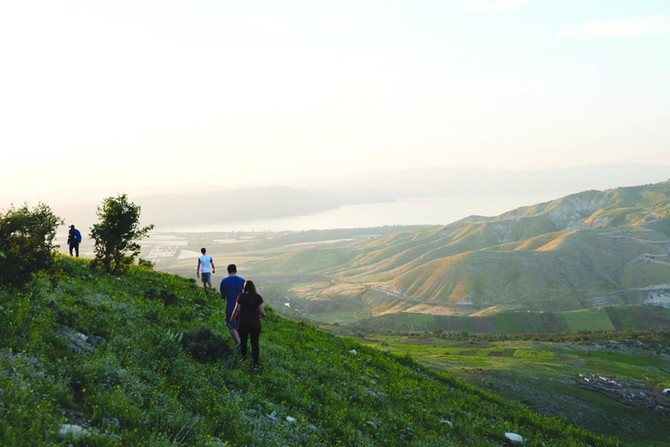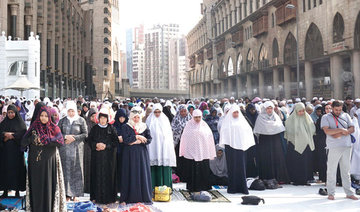AMMAN: From the guesthouse roof, the panorama takes in three countries, meandering from the ruins of ancient Gadara on a Jordanian hilltop, over the Sea of Galilee with the city of Nazareth visible in the distance, and across green fields to the Golan Heights.
It’s one of the main reasons visitors make their way up to the small village of Umm Qais in north Jordan, which is also home to one of the Decapolis cities of ancient Rome.
Yet few stay overnight and the village derives little profit from those coming to take in its extraordinary sites. Most tourists dash up on a day trip from Amman before making their way down to Petra, according to Roddy Boyle, Lodge Manager at Beit Al Baraka guesthouse.
“The destinations in the south (Petra, Aqaba, the Dead Sea) are more publicized, but Umm Qais is quite unique, there’s nothing like it in Jordan,” said Boyle, who has spent a year living among the community here and experiencing Jordanian hospitality firsthand.
Visitors planning to take in Jordan’s Roman ruins would more likely head to Jerash just outside Amman, rather than making the 90-minute drive up to Umm Qais in the north, put off perhaps by its proximity to the border with Syria.
There seemed little call for tourist accommodation in the village, but Baraka, the sustainable tourism company behind Beit Al Baraka guesthouse, is determined to push Umm Qais higher up the visitor agenda and harness the area’s tourism potential for the benefit of the local community.
“By creating a cluster of tourism experiences, we have been able to increase the length of stay of visitors in Umm Qais from an average of two hours to two days,” said Muna Haddad, Managing Director at Baraka.
“The benefit goes both ways,” she added, with travelers gaining an opportunity to interact with local Jordanians while contributing to the creation of much-needed jobs in the area.
So far, the project has impacted 38 families, who have taken up employment as guides, cooks and farmers on activities from hiking and cycling to bee-keeping and camping.
The project feeds into the 2017-2021 National Tourism Strategy, which outlines Jordan’s aims to attract more tourists to the country and increase the sector’s revenues while responding to the requirements of each governorate to drive growth at the local level.
Regional turmoil has hit Jordan’s tourism industry hard in recent years, but the industry is showing signs of recovery. Ministry of Tourism figures indicated a 10.5 percent increase in the first five months of 2017 compared to the same period last year.
With tourism revenues up 14.5 percent in the first half of 2017, buoyed by new growth markets, including North America and Europe, Jordan is positioning itself for a comeback, promoting lesser-known sights alongside the headline attractions.
In particular, the Jordan Tourism Board (JTB) is developing a new adventure tourism strategy to promote the country as a destination for climbing, hiking, diving, canyoneering and other outdoor pursuits.
“We’re trying to break the stereotype that equates Jordan with Bedouin tribes, Petra and deserts,” said Hakim Ahmad Al-Tamimi, head of the Adventure Tourism Department at JTB. The focus now, he said, is on “mountains, greenery and waterfalls.”
The department is also publicizing existing action-adventure events, such as the annual Dead to Red race, a 242-kilometer relay running from the Dead Sea to the Red Sea in Aqaba, and the Full Moon Marathon in Wadi Rum, one of Jordan’s most spectacular landscapes,
A grant has also been given to the Jordan Trail Association (JTA) to market a new 400-mile hiking route that runs from the top of the country to the bottom.
“It’s a great way to experience the real Jordan,” said Bashir Daoud, General Manager at the Jordan Trail Association. The route passes through 52 local villages and organisers are working to engage communities with homestays and cooking experiences among other tourism-related enterprises.
“This is the other side of tourism that you don’t get to see. Visitors can go in and interact directly with locals, meet Bedouin people and see a different way of life,” Daoud added.
JTA is also working with The Royal Society for the Conservation of Nature (RSCN) in Jordan to pass through a greater number of national parks and “show tourists more of Jordan’s best side.”
To illustrate the scope of Jordan’s unsung attractions, JTB recently launched a series of promotional videos that take viewers on hikes through deep desert canyons, abseiling down 100-foot waterfalls, climbing to the summits of Wadi Rum peaks and winding along the forest trails of verdant Ajloun in the north.
The campaign taps into a broader global trend towards adventure tourism, with Middle East countries like Jordan poised to take advantage of people’s desire to head off the beaten track in lesser-known locations.
“The demand for experiential and meaningful travel is growing, and Jordan is at the forefront of this movement,” said Haddad.
Jordan attracts tourists with the promise of adventure
Jordan attracts tourists with the promise of adventure

India seals $3bn LNG agreement with UAE

- Leaders hold talks to strengthen trade, defense ties
NEW DELHI, DUBAI: India signed a $3 billion deal on Monday to buy liquefied natural gas from the UAE, making it the Gulf country’s top customer, as the leaders of both countries held talks to strengthen trade and defense ties.
The agreement was signed during a very brief two-hour visit to India by UAE President Sheikh Mohammed bin Zayed Al-Nahyan for talks with Indian Prime Minister Narendra Modi.
They pledged to double bilateral trade to $200 billion in six years and form a strategic defense partnership.
Abu Dhabi state firm ADNOC Gas will supply 0.5 million tonnes of LNG a year to India’s Hindustan Petroleum Corp. for 10 years, the companies said.
ADNOC Gas said the agreement brings the total value of its contracts with India to over $20 billion.
“India is now the UAE’s largest customer and a very important part of ADNOC Gas’ LNG strategy,” the company said.
The UAE is India’s third largest trading partner and Sheikh Mohammed was accompanied by a government delegation that included his defense and foreign ministers. The two sides signed a letter of intent to work toward forming a strategic defense partnership, India’s Foreign Secretary Vikram Misri told reporters.
Misri, however, said that the signing of the letter of intent with the UAE does not mean that India will get involved in regional conflicts.
“Our involvement on the defense and security front with a country from the region does not necessarily lead to the conclusion that we will get involved in particular ways in the conflicts of the region,” he said.














